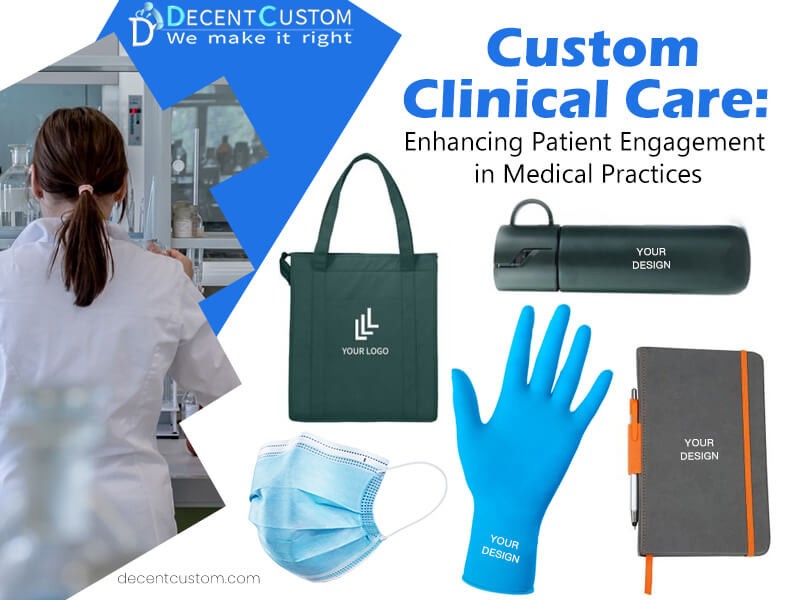Custom Clinical Care: Enhancing Patient Engagement in Medical Practices
Introduction: The New Era of Patient-Centric Healthcare
In today's healthcare landscape, patient engagement is not just a buzzword—it's a fundamental aspect of care. Custom clinical care represents a shift towards a more personalized, patient-centered approach, significantly impacting patient satisfaction and treatment outcomes.
Customized Patient Materials - Educational Brochures and Guides
Empowering Patients Through Information
Customized patient materials, such as educational brochures and guides, play a vital role in patient care. These resources, tailored to individual needs, help in demystifying medical procedures and empower patients to make informed decisions about their health.
Branding in the Clinic - Signage, Decor, and Uniforms
Creating a Welcoming Environment
A clinic's branding, including signage, decor, and staff uniforms, significantly impacts patient perception and comfort.
|  |
Consistent and thoughtful branding helps in creating a welcoming, professional environment, fostering trust and confidence among patients.
Digital Engagement - Custom Apps and Online Portals
The Digital Connection
Incorporating digital engagement tools like custom apps and online patient portals enhances communication and accessibility. These platforms offer convenience for appointment scheduling, accessing medical records, and direct communication with healthcare providers.
Personalized Care Plans - Tailoring Services to Individual Needs
The Personal Touch in Healthcare
Personalized care plans, designed to meet the unique needs of each patient, are the cornerstone of custom clinical care. This approach ensures that every patient receives care that is not only medically sound but also aligns with their personal preferences and lifestyle.
Community Outreach - Branded Health Events and Seminars
Engaging with the Wider Community
Community outreach through branded health events and seminars is an effective way to enhance a clinic's presence in the community. These events provide valuable information, promote health awareness, and establish the clinic as a trusted healthcare resource.
Patient Education - Workshops and Custom Educational Tools
Knowledge as a Pillar of Health
Patient education through workshops and custom educational tools is key to empowering patients. Educated patients are more likely to engage actively in their healthcare, leading to better outcomes and higher satisfaction.
Loyalty Programs - Rewards for Regular Patients
Fostering Long-Term Relationships
Loyalty programs for regular patients are an excellent strategy for enhancing patient engagement and retention. Rewards for regular check-ups and referrals can encourage ongoing patient-clinic relationships.
Real-Life Cases: Transformative Patient Engagement
Case Study 1: The Digital Leap
Consider the transformation of GreenLeaf Clinic. They introduced a custom app allowing patients to book appointments, access their health records, and communicate with their doctors. This digital integration resulted in a 50% increase in patient engagement and a noticeable improvement in patient satisfaction, showcasing the power of digital tools in healthcare.
Case Study 2: The Community Connector
Next is the story of Riverdale Medical Center, which hosted a series of health awareness seminars and workshops in their local community.
 | These events, branded with large window decals and other promotional materials, not only educated the public but also significantly increased the clinic's visibility and patient influx.
|
Looking Ahead: The Future of Patient Engagement in Healthcare
Embracing Technology and Personalization
The future of patient engagement lies in the seamless integration of technology, personalization, and community-oriented approaches. Innovations in digital health, along with a continued focus on patient-centered care, are set to redefine the patient experience in healthcare.
Conclusion: Pioneering a New Standard in Patient-Centered Healthcare
In conclusion, the integration of custom clinical care in medical practices marks a significant advancement in the healthcare sector. By embracing personalized patient materials, innovative digital engagement tools, and tailored care plans, medical practices are not just treating illnesses but are nurturing a holistic, patient-centered healthcare experience. This approach reflects a deep understanding of the diverse needs and preferences of patients, ensuring that each individual feels heard, valued, and cared for uniquely.
Moreover, the emphasis on community outreach and patient education further solidifies the role of medical practices as pillars of health and wellness within the community. Through these efforts, clinics are not only enhancing their brand but are also contributing to a more informed and health-conscious society.
The future of healthcare is undoubtedly heading towards more personalized, technologically integrated, and patient-focused models. Clinics and medical practitioners who adopt these innovative strategies will not only see enhanced patient engagement and satisfaction but will also set new standards in healthcare delivery. Ultimately, the goal is to create a healthcare ecosystem where patients are active participants in their health journey, supported by customized, compassionate, and cutting-edge care.
FAQ Section
1. How do customized patient materials benefit healthcare practices?
Customized patient materials, such as educational brochures, enhance patient's understanding of their health conditions and treatment options, leading to better-informed and more engaged patients.
2. Why is digital engagement crucial in modern healthcare?
Digital engagement tools like custom apps and online portals provide patients with easy access to health information and services, improving communication and overall healthcare experience.
3. What is the impact of personalized care plans in healthcare?
Personalized care plans ensure that patient treatment is tailored to their specific needs and preferences, leading to improved patient satisfaction and treatment outcomes.
4. How do loyalty programs improve patient engagement?
Loyalty programs incentivize regular health check-ups and foster long-term relationships between patients and healthcare providers.
5. What are the emerging trends in patient engagement?
Emerging trends include the use of AI and machine learning for personalized care, the integration of telemedicine, and a greater emphasis on mental health and wellness.





















